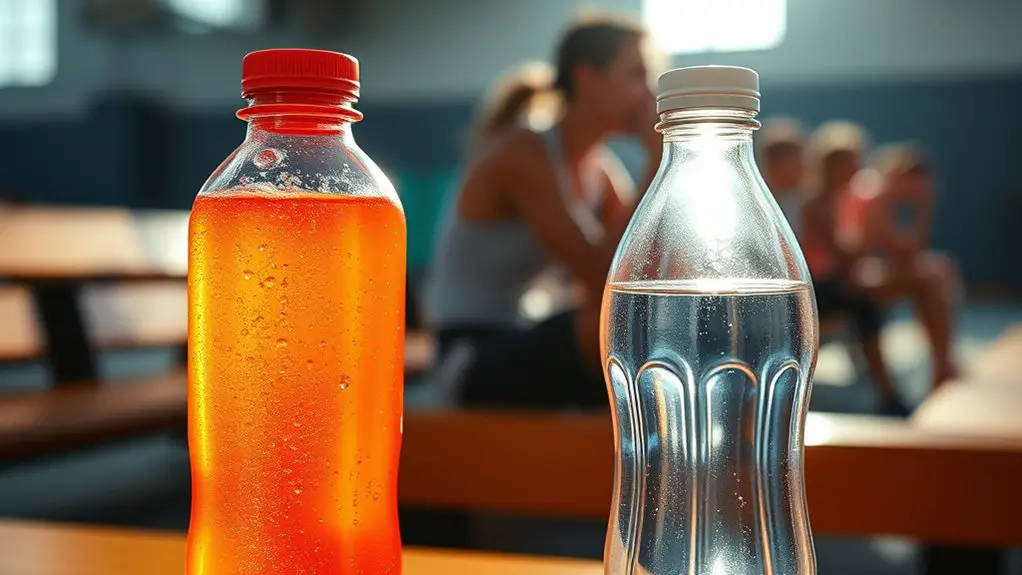To optimize your electrolyte balance for peak performance, focus on maintaining a steady intake of key minerals like sodium, potassium, and magnesium. Hydrate regularly, paying attention to urine color for a hydration check. Incorporate natural sources such as fruits, nuts, and leafy greens, along with supplements when needed, especially during intense workouts. Adjust your intake based on activity duration and intensity to guarantee your muscles and nerves function effectively. There's more to learn about fine-tuning your approach.
Understanding Electrolytes and Their Functions
Electrolytes are essential minerals that help maintain your body's balance and overall performance. These charged particles, like sodium, potassium, calcium, and magnesium, play a significant role in various bodily functions. They help regulate your hydration levels, ensuring that your cells receive the fluids they need to thrive. When you sweat or engage in intense exercise, you lose these important minerals, which can affect your energy levels and physical capabilities.
Understanding how electrolytes function empowers you to take control of your health and performance. For instance, sodium helps manage blood pressure and volume, while potassium supports muscle contractions and nerve signals. Calcium is fundamental for bone strength and muscle function. By ensuring you have a balanced intake of these minerals, you can optimize your body's performance, enhance recovery, and enjoy the freedom that comes with being at your best. Replenishing electrolytes during long workouts is crucial to prevent fatigue and maintain stamina. Take charge of your electrolyte balance, and release your true potential!
Signs of Electrolyte Imbalance
If you're feeling unusually fatigued or experiencing muscle cramps, it might be a sign of an electrolyte imbalance. This can also affect your physical performance and mental clarity, making it harder to focus or push through a workout. Recognizing these symptoms early can help you take action and restore balance for peak performance.
Common Symptoms Experienced
When your body experiences an electrolyte imbalance, you might notice a range of symptoms that can impact your daily activities. You could feel fatigued, making even the simplest tasks seem intimidating. Muscle cramps might become a common nuisance, pulling you away from your favorite activities. You may also experience dizziness or lightheadedness, leaving you feeling unsteady and off-balance. If you find yourself unusually thirsty or craving salty snacks, that's another sign something's off. Mood swings or irritability can also creep in, affecting your interactions and overall vibe. Recognizing these symptoms is key to regaining your freedom and energy. By paying attention to your body, you can take steps to restore balance and feel your best again.
Physical Performance Indicators
While you might not always think about it, your physical performance can reveal a lot about your electrolyte balance. When you're feeling sluggish or fatigued during workouts, it could be a sign that your electrolytes are off. Muscle cramps, weakness, or even dizziness can indicate dehydration or an imbalance. If you're struggling to maintain endurance or notice a drop in strength, it's worth checking your hydration and electrolyte intake. Cravings for salty snacks might also signal that your body needs more sodium. Listen to your body; it's often trying to tell you something. By recognizing these indicators, you can make the necessary adjustments to support your performance and enjoy the freedom of movement you crave.
Mental Clarity Effects
Electrolyte imbalance can greatly impact your mental clarity, making it hard to focus and think clearly. If you're feeling foggy, forgetful, or struggle to concentrate, it might be a sign that your electrolyte levels are off. Low sodium can lead to confusion and irritability, while inadequate potassium may cause fatigue and mental sluggishness. You might even experience mood swings or heightened anxiety. These symptoms can hinder your ability to perform at your best, both mentally and physically. To maintain your freedom and sharpness, it's essential to stay hydrated and replenish your electrolytes through balanced meals or sports drinks. By keeping your electrolytes in check, you're supporting not just your body, but your mind too.
Dietary Sources of Electrolytes
Although many people might not realize it, dietary sources of electrolytes play a crucial role in maintaining your body's fluid balance and overall performance. To keep your levels ideal, you should include foods rich in key electrolytes—sodium, potassium, magnesium, and calcium—in your diet.
Fruits like bananas, avocados, and oranges are fantastic sources of potassium, while leafy greens like spinach and kale pack a magnesium punch. Don't overlook nuts and seeds; they're not just tasty snacks but also loaded with essential minerals. For calcium, think dairy products or fortified plant-based alternatives.
Adding a pinch of salt to your meals can help with sodium intake, but remember to strike a balance—don't go overboard. By choosing a diverse array of whole foods, you can effortlessly support your electrolyte needs, giving your body the freedom to perform at its best. Staying hydrated is also vital, as proper hydration helps avoid fatigue and cramps during workouts.
Hydration Strategies for Optimal Balance
Maintaining ideal hydration is essential for achieving the perfect electrolyte balance, especially when you're active. To guarantee you stay maximally hydrated, consider these strategies:
- Drink Regularly: Don't wait until you're thirsty. Sip water throughout the day, especially before, during, and after your workouts.
- Monitor Color: Check the color of your urine. Light yellow indicates good hydration, while dark yellow suggests you need more fluids.
- Choose Electrolyte Drinks Wisely: Opt for beverages that contain balanced electrolytes, especially during intense exercise or long-duration activities.
- Incorporate Hydrating Foods: Include fruits and vegetables like watermelon, cucumbers, and oranges in your diet. They not only hydrate but also replenish essential electrolytes.
Additionally, maintaining fluid levels empowers runners to achieve their goals during races.
Supplements: When and How to Use Them
When it comes to optimizing your electrolyte balance, knowing when and how to use supplements can make a big difference. You'll want to contemplate the timing of your intake and the types of electrolyte supplements that best fit your needs. Let's explore how to effectively integrate these supplements into your routine for peak performance.
Timing for Supplement Intake
Understanding the best times to take supplements can greatly enhance your electrolyte balance and overall performance. Timing your intake wisely can help you feel more energized and ready to conquer challenges. Here are some tips to reflect on:
- Pre-Workout: Take electrolytes about 30 minutes before exercise to prepare your body.
- During Exercise: Sip on electrolyte drinks for sustained hydration and endurance.
- Post-Workout: Replenish lost electrolytes within 30 minutes after your session for ideal recovery.
- Daily Routine: Integrate supplements into your routine, ideally at the same time each day, to establish consistency.
Types of Electrolyte Supplements
Choosing the right type of electrolyte supplement can greatly impact your performance and recovery. With various options available, it's vital to understand their benefits:
| Type | Key Benefits |
|---|---|
| Electrolyte Tablets | Convenient, portable, customizable |
| Sports Drinks | Quick energy, hydration during workouts |
| Powders | Versatile, mix to your desired strength |
| Capsules | Easy to take, precise dosage |
When you're sweating it out or pushing your limits, knowing when and how to use these supplements is important. Whether you're prepping for a race or rehydrating post-workout, find the right fit for your lifestyle. Embrace the freedom to choose what works for you and fuel your performance!
The Role of Electrolytes in Recovery
While you might focus on hydration during your workouts, the role of electrolytes in recovery is equally essential. These important minerals help restore balance in your body post-exercise and can greatly enhance your recovery process. Here's how they contribute:
- Muscle Repair: Electrolytes like potassium and magnesium assist in muscle contraction and relaxation, aiding in quicker recovery.
- Fluid Balance: Sodium helps regulate fluid levels, preventing dehydration and ensuring your body functions effectively after intense activity.
- Nerve Function: Calcium and sodium are critical for nerve signaling, allowing your body to communicate effectively and coordinate movements.
- Energy Production: Electrolytes play a key role in converting nutrients into energy, helping to replenish your reserves after workouts. Additionally, maintaining a proper electrolyte balance is crucial during physical activity for optimal muscle function.
Tailoring Your Electrolyte Intake for Different Activities
How can you guarantee your electrolyte intake matches the demands of your activity? It's all about customization. If you're hitting the gym for a short workout, a simple water and a pinch of salt might do the trick. However, for longer endurance activities like marathons or triathlons, you'll want a specialized sports drink that includes sodium, potassium, and magnesium to keep you energized and prevent cramping.
Listening to your body is crucial, as proper hydration maintains energy levels and endurance during exercise. On hot days or during high-intensity sessions, consider increasing your intake. If you're enjoying a leisurely hike, plain water may suffice.
Experiment with different sources—tablets, powders, or natural foods—until you find what feels right. Remember, the goal is to maintain balance without feeling weighed down. Tailor your approach, stay flexible, and keep your performance soaring!
Frequently Asked Questions
Can Electrolyte Imbalances Affect Mental Performance or Concentration?
Yes, electrolyte imbalances can impact your mental performance and concentration. When your body's chemistry is off, you might feel foggy or distracted, hindering your ability to focus and think clearly during important tasks.
How Do Environmental Factors Influence Electrolyte Needs During Exercise?
You might think your body's needs stay the same, but environmental factors like heat and humidity can drastically change electrolyte requirements during exercise. Staying aware of these influences helps you maintain peak performance and enjoy your freedom.
Are There Specific Electrolyte Ratios for Endurance vs. Strength Activities?
When it comes to endurance versus strength activities, you'll want different electrolyte ratios. Endurance typically needs more sodium and potassium, while strength focuses on magnesium and calcium. Balance is key, so listen to your body's signals.
Can I Rely Solely on Food for Electrolyte Replenishment?
You can rely on food for electrolyte replenishment, but it might not cover all your needs. Balance your diet with variety, consider supplements if necessary, and listen to your body to maintain ideal levels.
What Are Common Myths About Electrolytes and Hydration?
You might think drinking gallons of water's enough, but that's a myth. Electrolytes matter too; hydration's not just about water. Balance's key, and you don't need fancy drinks—whole foods often suffice for replenishment.




